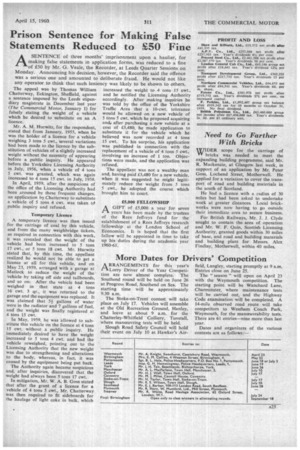Prison Sentence for Making False Statements Reduced to £50 Fine
Page 27

If you've noticed an error in this article please click here to report it so we can fix it.
ASENTENCE of three months' imprisonment upon a haulier, for making false statements in application forms, was reduced to a fine of £50 by Mr. G. Veale, the Recorder, at Leeds Quarter Sessions on Monday. Announcing his decision, however, the Recorder said the offence was a serious one and amounted to deliberate fraud. He would not like any operator to think that such leniency was likely to be shown to others.
The appeal was by Thomas William Chatterway, Eckington, Sheffield, against a sentence imposed by the Leeds stipendiary magistrate in December last year (The Commercial Motor, January 1) for falsely stating the weight of a vehicle which he desired to substitute on an A licence.
Mr. A. M. Hurwitz, for the respondent, stated that from January, 1955, when he was the holder of a licence for a vehicle weighing 3 tons 5 cwt., several variations had been made to the licence by the substitution of vehicles of a slightly increased weight without the necessity of appearing before a public inquiry. He appeared before the Yorkshire Licensing Authority in July, 1956, when a vehicle of 4 tons 5 cwt. was granted, which was again increased to 4 tons 15 cwt. in July, 1958.
In April, 1959, after the suspicions of the office of the Licensing Authority had been aroused by these frequent changes, an application by Chatterway to substitute a vehicle of 5 tons 4 cwt. was taken td public inquiry and refused.
Temporary Licence
A temporary licence was then issued for the carriage of coal by this vehicle, and from the many weighbridge tickets, as required in connection with this work, it was revealed that the weight of the vehicle had been increased to 5 tons 17 cwt., or 5 tons 18 cwt. Mr. Hurwitz stated that, by this time, the appellant realized he would not be able to get a licence at all for this vehicle, and on May 23, 1959, arranged with a garage at Matlock to reduce the weight of the vehicle by taking off side and tailboards, and so on: After the vehicle had been weighed in that state at 4 tons 16 cwt. 3 qr., it was returned to the garage and the equipment was replaced. It was claimed that 5+ gallons of water were in the radiator and 7 gallons of fuel, and the weight was finally registered at 4 tons 15 cwt.
In May, 1959, he was allowed to substitute this vehicle on the licence at 4 tons 15 cwt. without a public inquiry. He immediately desired to have the weight increased to 5 tons 4 cwt. and had the vehicle reweighed, pointing out to the Licensing Authority that the new weight was due to strengthening and alterations to the body, whereas, in fact, it was caused by the equipment being put back.
The Authority again became suspicious and, after inquiries, discovered that the weight had always been 5 tons 17 cwt.
In mitigation, Mr. W. A. B. Goss stated that after the grant of a licence for a vehicle of 4 tons 5 cwt., Mr. Chatterway was then required to fit sideboards for the haulage of light coke in bulk, which
increased the weight to 4 tons 15 cwt., and he notified the Licensing Authority accordingly. After making inquiries he was told by the office of the Yorkshire Traffic Area that a 10-cwt. tolerance would be allowed on a new vehicle of 5 tons 5 cwt. which he proposed acquiring and after purchasing a new vehicle at a cost of £3,480, he made application to substitute it for the vehicle which he believed was now recorded at 4 tons 15 cwt. To his surprise, his application was published in connection with the replacement of a vehicle of 4 tons 5 cwt., involving an increase of 1 ton. Objections were made, and the application was refused.
The appellant was not a wealthy man and, having paid £3,480 for a new vehicle, when it was suggested he might legitimately reduce the weight from 5 tons 5 cwt., he adopted the course which brought him to court.
15,000 FELLOWSHIP
A GIFT of £5,000 a year for seven r-k years has been made by the trustees of the Rees Jeffreys fund for the establishment of a Rees Jeffreys research fellowship at the London School of Economics. It is hoped that the first fellow will be appointed in time to take up his duties during the academic year 1960-61.




























































































